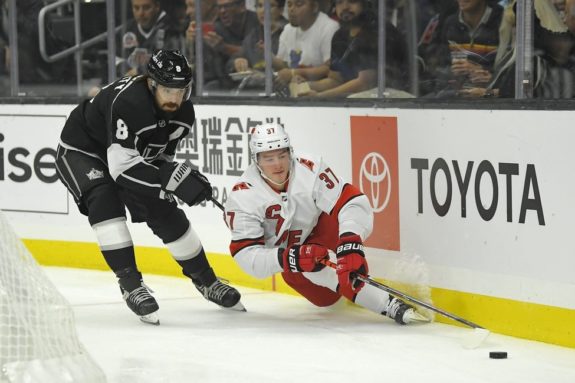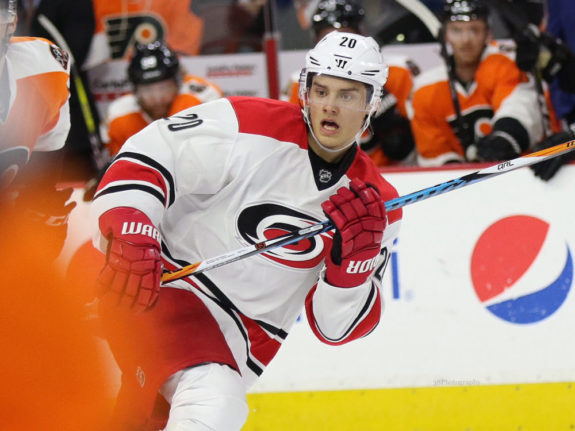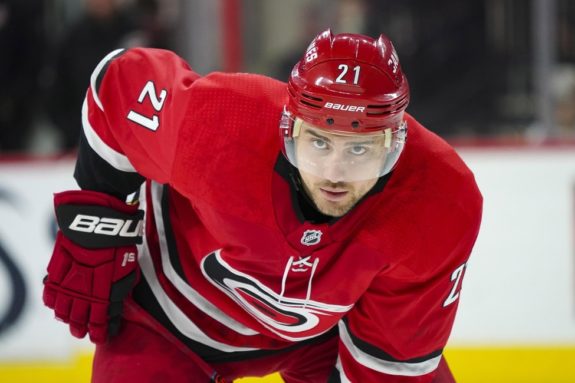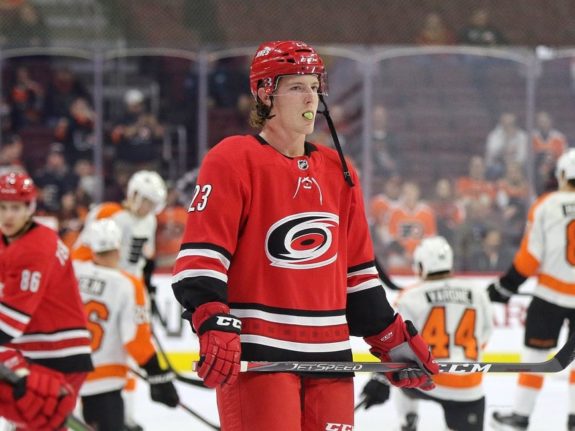There hasn’t been much to complain about lately for the Carolina Hurricanes. They’re 6-2-0, tied for second place in the NHL, and their team seems to be clicking on and off the ice. The 2019-20 season is still in its infancy, but the Hurricanes are currently on a 123-point pace. While that’s probably not sustainable, they do have a team that’s more than capable of finishing with over 100 points, which they haven’t achieved since 2005-06 – the year they won the Stanley Cup.
Beneath the surface of their success, there have been a few red flags early that are making ‘Canes fans take warning. And if these themes continue, there could be some bumps down the road.
Lack of Discipline
It drives every head coach crazy and Rod Brind’Amour is no different. The Hurricanes have taken a league-high 39 minor penalties this season, and it’s been the most obvious catalyst that has stifled their momentum and frustrated their coach.
“They’re calling lots of things. That’s just how it is now. We’ve got to kill them, though. We’ve got to do a better job,” Brind’Amour said following the Hurricanes’ 5-2 loss Wednesday against the San Jose Sharks, in which they allowed two power play goals in the first period. “At the end of the day, you’ve got to kill them, and we didn’t. When we get our power play, we’ve got to make it count, and we didn’t. There’s the game.”
Tripping and interference are Carolina’s two most common infractions, accounting for 49% of all penalties taken by the Hurricanes so far this season. The abundance of those kinds of penalties suggests the players are making lazy, careless decisions when caught out of position. Forwards Nino Niederreiter and Andrei Svechnikov are the two most guilty culprits, having earned five minor penalties each in the eight games this season.

Unfortunately for the Hurricanes, their penalty kill isn’t good enough to make up for their lack of discipline. They’ve been able to kill off 77.8 percent of penalties, which is currently 19th in the NHL, but if that number is sustained over the course of 82 games, they’re in trouble. That penalty-kill rate would have been bottom-five in the league last season.
The penalty problem is slowly being corrected, but they still have a long way to go. Through the first four games of the season, the Hurricanes took 22 minor penalties. In the four games since, they’ve chipped that number down to 17. It’s still not where they want to be, but it seems to be trending in a better direction.
For the time being, this is an issue the Hurricanes can’t allow to snowball out of control. They need to tone down their recklessness, harness their intensity and play smart hockey, otherwise the penalty box bench is going to stay toasty warm.
3 Forwards Struggling Offensively
Sebastian Aho’s struggles have been well documented. After scoring 83 points in 82 games in a career year last season, Aho has debuted with three points in eight games to start this season, and two of those were empty-net goals.

The chances have been there – he leads the team with 28 shots – but he’s been snakebitten since signing his $42.27-million contract over the summer. We know Aho is going to come around – he’s an established superstar in this league, and he’s still been noticeable on the ice despite his lack of scoring. Don’t push the button on Aho yet.
His linemate, Niederreiter, hasn’t been able to find the net either. He’s one of only three Carolina forwards to have played every game this season and still not have a goal (Warren Foegele, Brock McGinn). With three assists to his name, and the only Hurricanes regulars to have a negative plus-minus rating, Niederreiter’s slow start is slightly more concerning.
After being acquired from the Minnesota Wild last January, Niederreiter caught flames, scoring 30 points in Carolina’s final 36 games on a top line with Aho and Justin Williams. In the playoffs, his production dipped significantly. He only scored one goal and three assists in 15 playoff games, and the Swiss winger still hasn’t been able to shake off the bad mojo.

In his six seasons with the Wild, Niederreiter averaged 0.52 points per game (PPG). When he first came to Carolina, he was producing at a 0.83 PPG rate, well above his career average. The 27-year-old has the ability to climb to that level, especially playing with Aho, but his slow start indicates he’s settling back to his career average. A 50-point season should be the minimum expectation for Niederreiter this year. The good news is, he and Aho are still posting excellent possession numbers – both are sporting a Corsi rating of over 60 percent.
The big boys for the Hurricanes will turn it around, but the biggest hole up front, and the greatest cause for concern, is the spot vacated by the former captain Williams. Svechnikov and center Jordan Staal have spent much of the season playing on the same line together, but the winger who accompanies them hasn’t been working out.
Brock McGinn should not be in a top-six role. He’s an excellent penalty killer, strong forechecker and a gritty presence better suited for the fourth line. But with the third line clicking so well, it leaves Brind’Amour with few options.

The Hurricanes would get much more mileage out of Svechnikov, their star second-overall pick in 2018, if they paired him with a player of similar skill. Recently, it’s been rumored the Hurricanes are interested in right-wingers Josh Ho-Sang from the New York Islanders and Jesse Puljujarvi, whose rights belong to the Edmonton Oilers. Either player could be a buy-low option for the Hurricanes that can bolster their top-nine to give them three strong scoring lines.
The Hurricanes haven’t had problems scoring this season, but it’s hard not to think they’re only a few injuries away from trouble. They can’t rely on their third line forever – their main guys need to step it up.
Power Play Hasn’t Found Its Groove
Nitpicking the Hurricanes’ power play has officially entered the category of beating a dead horse. It cursed them in last season’s playoffs, executing at only 9.6 percent through 15 games. This season, they have a few more weapons up front, and they’ve split their power play into two relatively even units.
Even on paper, anyway. The unit comprised of Svechnikov, Teuvo Teravainen, Erik Haula, Ryan Dzingel and Dougie Hamilton has scored 14 out of the 15 total power play points (PPP) on the team. The other is a lone assist from rookie Martin Necas.
Aho’s struggles have seeped into his crew as well, where he, Niederreiter, Jake Gardiner and Jordan Staal have yet to tally a PPP. Overall, Carolina’s power play sits 22nd in the league at 17.8 percent.
Unit 1 sees more ice time – an average of 3:14 minutes per game, while Aho’s unit averages 2:04 per game. Unit 1 was firing on all cylinders in the first four games of the season, where they were converting at a 33.3 percent rate. But in the four games since, the Hurricanes haven’t been able to convert at all with the man advantage, going 0-for-13.
A shakeup on the power play could be just what Aho needs to get his offense going again, and now could be the time to mix up the groups to find a spark. Otherwise, special teams as a whole could anchor the Hurricanes as they attempt to climb the standings.